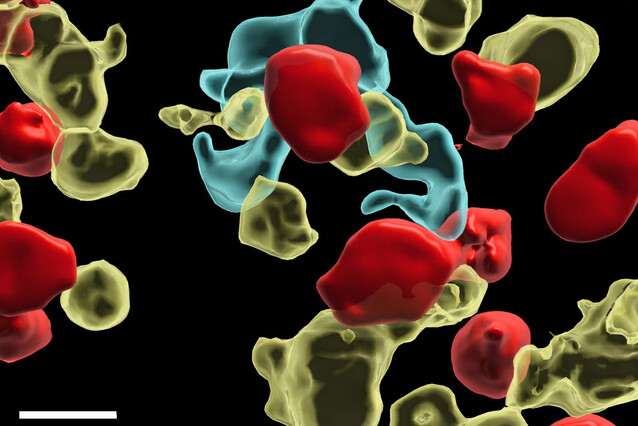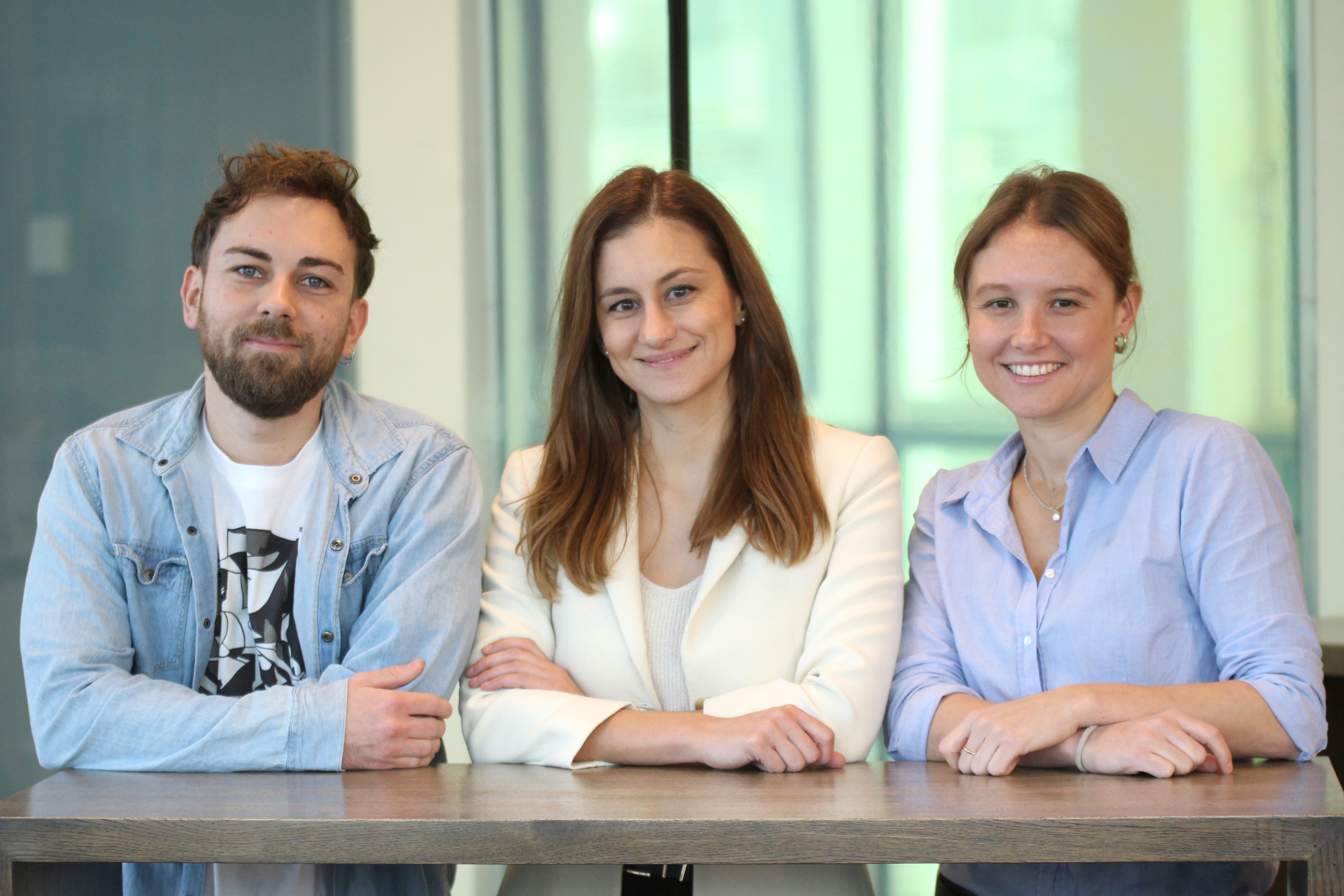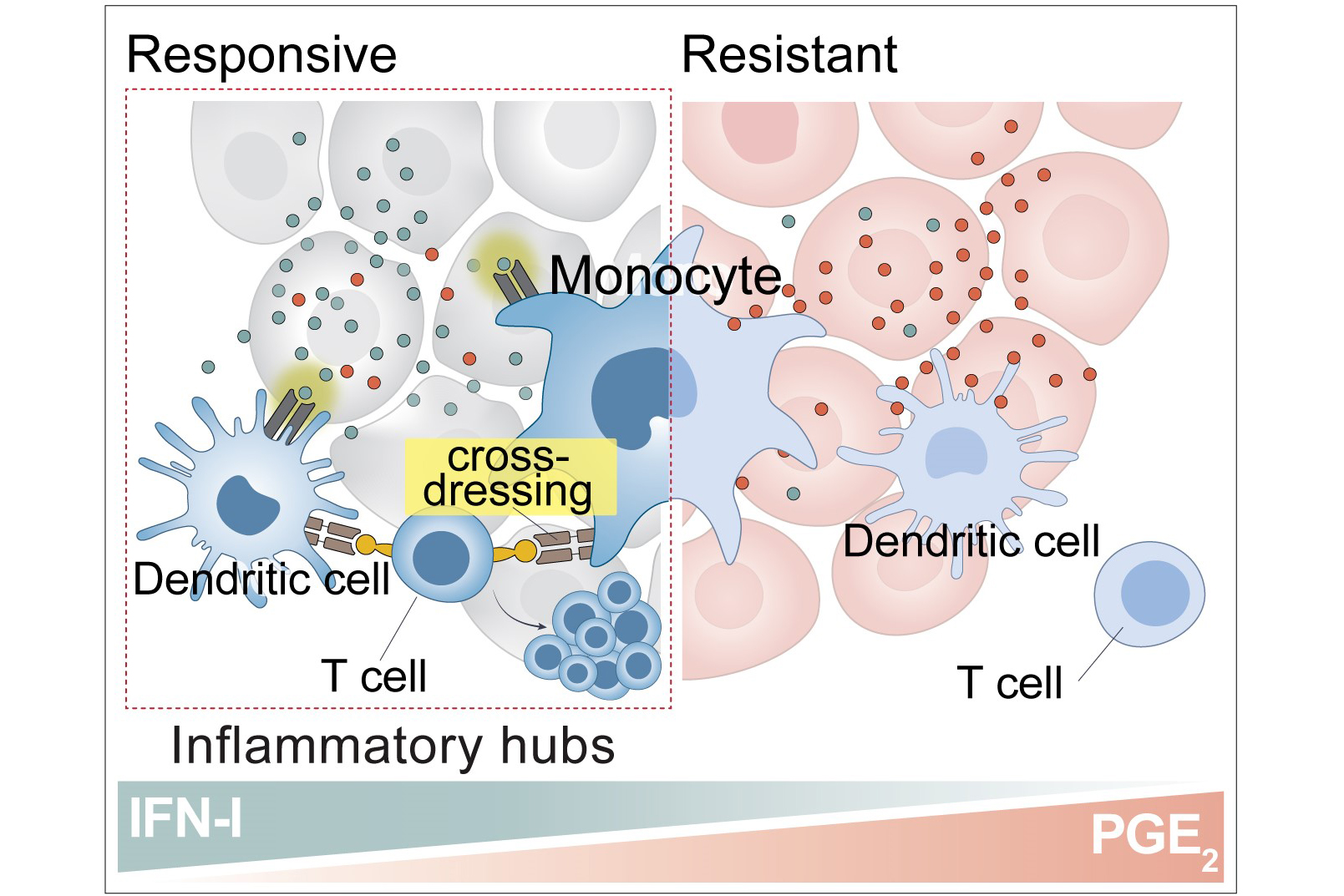A turning point for cancer treatment: monocytes boost T-cells in immunotherapy

Immunotherapy has revolutionised cancer treatment in recent years, offering hope for previously incurable cancers by using the immune system to fight them. However, many cancers evade immune attacks, leading to treatment resistance. Scientists led by Anna Obenauf at the IMP now discovered the crucial role of a type of immune cell—inflammatory monocytes—in reactivating cancer-killing T cells within tumours. The findings, published in the journal Nature, make monocytes a promising target to boost immunotherapies, potentially benefitting patients affected by a range of cancers, including melanoma, lung, pancreatic, and colorectal cancer.
Over the past decades, immunotherapy has transformed cancer treatment, offering effective options for diseases once considered uncurable, such as melanoma, lung, and bladder cancers. What began as laboratory research has now moved to real-world clinical applications, providing new possibilities for patients facing a range of challenging conditions.
Immunotherapy works by harnessing the body’s own immune system to eliminate cancer cells, either by broadly enhancing immune activity or by targeting specific pathways to recognise, attack, and destroy these cells.
While immunotherapy has made remarkable progress in treating patients, significant challenges persist. Chief among these is cancer’s ability to evade the immune system—by altering its cells to avoid detection and suppressing immune responses through the establishment of an immune-evasive tumour microenvironment. As a result, a substantial number of patients do not respond to current therapies. For example, over 50 percent in the case of those affected by melanoma, the most aggressive form of skin cancer.
Much of how cancer evades the immune response remains unknown, largely due to the complex cascade of molecular events in the interactions between cancer and immune cells. Understanding the nuances of these processes will be key to developing more effective therapies.
In a study led by Anna Obenauf, Senior Group Leader at the IMP, an international team of researchers integrated cutting-edge tools, including melanoma mouse models, single-cell RNA sequencing, and advanced functional genetics and imaging technologies, to push the boundaries of our understanding of the immune system’s role in fighting cancer. The study, now published in the journal Nature, reveals an additional type of immune cell involved in stimulating the immune response against cancer, opening up possibilities for new strategies to boost immunotherapy and potentially expand its benefits to more patients.

Rewriting the cancer immunity cycle
Researchers studying the body’s antitumour defences often refer to the 'cancer immunity cycle'—a series of steps through which immune cells recognise and eliminate cancer cells. At the core of this cycle are T cells, the immune system's primary cancer-fighting cells. But T cells do not work alone; they rely on activation from other immune cells, particularly antigen-presenting cells (APCs) such as dendritic cells–the main T cell activators.
The process begins when cancer cells release protein fragments, or antigens, that are captured by APCs. These cells present the antigens to T cells, effectively 'priming' them to recognise cancer cells as targets. Once activated in the lymph nodes, T cells travel to the tumour site to destroy it, releasing new antigens that restart the cycle of immune activation.
“The cancer immunity cycle, as we understand it today, is actually incomplete—we’re missing the crucial step of T cell reactivation within the tumour microenvironment,” says Anais Elewaut, co-first author of the study and a student in the Vienna BioCenter PhD Program. “We discovered that when T cells reach the tumour, they still need additional activation from other immune cells to be fully effective.”
To identify the missing components in this process, the scientists used powerful cell models to investigate the factors that make cancer susceptible to the most common immunotherapies.
Two melanoma cell line models derived from mice that respond differently to commonly used therapies were generated at the Obenauf lab: one that responds well to both immunotherapy and targeted therapy, which applies substances aimed at specific cancer cells; the other resistant to both these treatment types. “With this system, we could closely compare responsive to resistant tumours, helping us figure out the key factors that determine whether a treatment will succeed or fail.”
The team first analysed the tumour environment in both models by profiling gene expression at the level of single cells, and then sorted and quantified immune cell types based on specific markers on their surface. “We were very interested when we noticed lots of monocytes in responsive tumours compared to resistant ones. Monocytes are a type of immune cell never reported to play a role in T cell stimulation,” explains Elewaut. For the longest time, researchers had been looking at dendritic cells as the main activators of T cells, overlooking the role of other immune cells. In contrast, the resistant model had few monocytes, but was filled with suppressive macrophages, which are known to inhibit immune responses.
“Monocytes were thought to play a limited role in cancer immunity,” explains Guillem Estivill, co-first author of the study and a student in the Vienna BioCenter PhD Program. “Now we show how the presence or absence of these specific immune cells can lead to very different treatment outcomes.” Whereas dendritic cells are critical for kickstarting the cancer immunity cycle in the lymph node, both dendritic cells and monocytes are needed to fully activate T cells in the tumour.
The scientists found that monocytes can directly ‘borrow’ parts of cancer cells, including antigens, and present them to T cells. This process, called ‘cross-dressing’, allows monocytes monocytes to reactivate T cells, which boosts their function in recognising and attacking cancer cells.

The study also shows how cancer cells evade immunity by making it harder for T cells to stay activated and perform effectively. Cancer cells increase production of the molecule prostaglandin E2, which blocks the action of both monocytes and dendritic cells. Simultaneously, cancer cells decrease the production of interferons—molecules that stimulate immune activity— thereby further weakening the immune system’s ability to fight the tumour. “We’ve seen that restoring the levels of these molecules brings T cells back to their cancer-killing action through the activation of monocytes,” explains Estivill.
Building on this discovery, one promising strategy will be to use COX inhibitors, such as aspirin—drugs that block the cyclooxygenase (COX) enzyme, which is responsible for producing molecules that cause inflammation such as prostaglandin E2. Additionally, stimulating interferon production could enhance the immune system's ability to combat cancer. These approaches could be combined with existing immunotherapies, providing new tools against cancers which are currently resistant to treatment.
The findings make monocytes promising targets to boost immunotherapies, with insights that have the potential to benefit a wide range of patients affected by cancers with similar molecular pathways to melanoma. These include lung, pancreatic, and colorectal cancer.
Future research will focus on exploring how stimulating T cells with monocytes and other immune cells plays out in different forms of immunotherapy. This knowledge could reveal new ways to overcome resistance to immunotherapies. “Clinical trials combining COX inhibitors and immunotherapy are on the horizon. And we already identified strategies to enhance their effectiveness,” says Anna Obenauf. “Our goal is to deepen the mechanistic understanding of anti-tumour immunity. I hope this will help us overcome resistance in more patients, making cancer immunotherapy a viable option for a broader range of patients.”
EVOMET network
Guillem Estivill is a PhD student in Anna Obenauf's lab at the IMP and a participant in the EVOMET network, a prestigious European consortium focused on understanding the evolution of metastasis in cancer. Funded by the European Commission’s Innovative Training Networks programme under the Marie Skłodowska-Curie Actions, and coordinated by the Institute for Research in Biomedicine (IRB) Barcelona, EVOMET brings together thirteen leading academic, clinical, and industrial institutions. The project trains young researchers in metastasis biology and therapeutic development. By fostering multidisciplinary and intersectoral collaboration, the network aims to accelerate the discovery of targeted therapies and improve clinical treatments for metastatic cancer.
Original Publication
Anais Elewaut, Guillem Estivill, Felix Bayerl, Leticia Castillon, Maria Novatchkova,
Elisabeth Pottendorfer, Lisa Hoffmann-Haas, Martin Schönlein, Trung Viet Nguyen,
Martin Lauss, Francesco Andreatta, Milica Vulin, Izabela Krecioch, Jonas Bayerl,
Anna-Marie Pedde, Naomi Fabre, Felix Holstein, Shona M. Cronin, Sarah Rieser,
Denarda Dangaj Laniti, David Barras, George Coukos, Camelia Quek, Xinyu Bai,
Miquel Muñoz i Ordoño, Thomas Wiesner, Johannes Zuber, Göran Jönsson,
Jan P. Böttcher, Sakari Vanharanta, and Anna C. Obenauf:
Cancer cells impair monocyte-mediated T cell stimulation to evade immunity. Nature.
DOI: 10.1038/s41586-024-08257-4
About the Vienna BioCenter PhD Program
Much of the work underlying this publication was done by doctoral students of the Vienna BioCenter PhD Program. Are you interested in a world-class career in molecular biology? Find out more: https://training.vbc.ac.at/phd-program/
Further reading